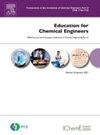Teaching practice on a compact desktop experimental system to enable facile hands-on learning of residence time distribution
IF 2.3
2区 教育学
Q1 EDUCATION, SCIENTIFIC DISCIPLINES
引用次数: 0
Abstract
To enhance student learning outcomes during the teaching of residence time distribution (RTD) theory, a compact open-source desktop RTD measurement device has been constructed for chemical reaction engineering (CRE) education. A safe, miniature CO2 cylinder serves as the fluid source, and ambient air, which is easily collected in situ, functions as the tracer gas. A Raspberry Pi®–based portable thermal conductivity detector (TCD) is employed as the detector, achieving RTD measurements with sufficient resolution. Low-cost PTFE tubes and put-in fitting connectors are used to easily construct different forms of reactor models for RTD experiments. The total cost of the experimental materials is approximately $200. During teaching practice, students are encouraged to construct the experimental device by themselves, measure RTDs for specified and self-designed reactors, and address a reactor diagnosis problem. The experiment does not require a laboratory setting, allowing students to conduct it at their convenience, anytime and anywhere. Through engaging and practical hands-on learning, students achieve comprehensive educational outcomes. In summary, the desktop RTD measurement device and the associated experimental contents represent an innovative approach in CRE education, addressing the evolving need to train modern chemical engineers with multifaceted capabilities.
在一个紧凑的桌面实验系统上进行教学实践,便于动手学习驻留时间分布
为提高学生在停留时间分布(RTD)理论教学中的学习效果,构建了一种用于化学反应工程(CRE)教学的小型开源桌面RTD测量装置。一个安全的微型CO2钢瓶作为流体源,环境空气作为示踪气体,很容易在现场收集。采用基于树莓派®的便携式热导率检测器(TCD)作为检测器,以足够的分辨率实现RTD测量。使用低成本的聚四氟乙烯管和插入式接头,可以轻松构建不同形式的RTD实验反应器模型。实验材料的总费用约为200美元。在教学实践中,鼓励学生自行搭建实验装置,对指定反应器和自行设计的反应器进行rtd测量,解决反应器诊断问题。实验不需要实验室设置,允许学生在他们方便的时候,随时随地进行。通过参与和实际的动手学习,学生获得全面的教育成果。总之,桌面RTD测量装置和相关的实验内容代表了CRE教育的一种创新方法,满足了培养具有多方面能力的现代化学工程师的不断发展的需求。
本文章由计算机程序翻译,如有差异,请以英文原文为准。
求助全文
约1分钟内获得全文
求助全文
来源期刊

Education for Chemical Engineers
Multiple-
CiteScore
8.80
自引率
17.90%
发文量
30
审稿时长
31 days
期刊介绍:
Education for Chemical Engineers was launched in 2006 with a remit to publisheducation research papers, resource reviews and teaching and learning notes. ECE is targeted at chemical engineering academics and educators, discussing the ongoingchanges and development in chemical engineering education. This international title publishes papers from around the world, creating a global network of chemical engineering academics. Papers demonstrating how educational research results can be applied to chemical engineering education are particularly welcome, as are the accounts of research work that brings new perspectives to established principles, highlighting unsolved problems or indicating direction for future research relevant to chemical engineering education. Core topic areas: -Assessment- Accreditation- Curriculum development and transformation- Design- Diversity- Distance education-- E-learning Entrepreneurship programs- Industry-academic linkages- Benchmarking- Lifelong learning- Multidisciplinary programs- Outreach from kindergarten to high school programs- Student recruitment and retention and transition programs- New technology- Problem-based learning- Social responsibility and professionalism- Teamwork- Web-based learning
 求助内容:
求助内容: 应助结果提醒方式:
应助结果提醒方式:


